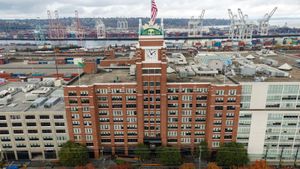Syrian rebel forces have recently launched an intense offensive against government troops around the Aleppo province, signaling the resurgence of conflict amid the already fragile situation following years of civil war. This sudden surge of violence reflects both long-standing tensions and current geopolitical maneuverings as local factions attempt to assert power over contested territories.
According to reports from Turkish security sources, the offensive was characterized as "limited" but quickly expanded as rebel factions allied with Hay'at Tahrir al-Sham (HTS) made significant territorial gains. The advances, which began on November 27, have seen the insurgents capturing several key villages as they push toward the outskirts of Aleppo city.
Eyewitness footage circulating on social media depicts rebel fighters advancing rapidly, raising fears of renewed clashes impacting civilian safety and stability. Notably, Turkey has tried to mediate and prevent the escalation but has struggled to manage the aggressive moves of these rebel groups.
Operational specifics reveal the involvement of not just HTS but also fighters from the Turkey-backed Syrian National Army, though many traditional factions remain hesitant to commit fully to the fight. Observers speculate this cautiousness stems from complicated relationships with Turkey and the unpredictability of the situation.
One anonymous Turkish security official stated, "What was initially planned as a limited operation expanded as regime forces began fleeing their positions." This development marks the first major offensive by Syrian rebels since 2020, when the Assad government, backed by Russian air power, secured territory throughout Idlib and surrounding areas, leading to dramatic shifts on the ground.
The motivation behind the latest offensive centers around retaliatory responses to the Syrian government's attacks, which have intensified recently, reportedly killing over thirty civilians, including children, and drawing heavy bombardment against educational facilities and residential neighborhoods.
"These armed groups launched their limited offensive to target the areas from which the regime's attacks were coming," the source said. This reactionary stance begs the question: has the long engagement of military strategies by various factions brought any real resolution to the conflicts, or merely entrenched them?
The importance of maintaining the integrity of the de-escalation zones established under the 2019 agreements between Turkey, Russia, and Iran plays heavily on the strategic calculations surrounding this offensive. Official military communication has reinforced the aim of recovering lost territory to restore the boundaries associated with the earlier, failed agreements.
Over the course of its civil war, Syria has seen numerous foreign actors attempt to influence the outcome. Turkey's involvement, particularly, has shaped the dynamics of the conflict, as various Kurdish groups and Assad loyalists grapple for control over the region. With the Syrian government now reevaluated and actively counterattacking, the fragile power balance remains on knife's edge.
The consequences of these renewed clashes extend beyond military gains, reflecting deep-seated issues of governance, displacement of populations, and strained humanitarian situations. Observers warn of the potential fallout if fewer controlled zones mean increased flooding of displaced civilians fleeing the conflict, exacerbated by the bitter winter conditions.
Many international stakeholders remain apprehensive about the developments. The influx of refugees, eruption of violence, and subsequent humanitarian crises could become viral topics on global platforms as concerned nations respond to waves of migration from the area.
The continued hostilities could also complicate Turkey's relationship with its allies, as NATO member but holding differing views on how to approach the Syrian conflict. The fallout of the recent escalation in Aleppo will present challenges not just locally, but influence diplomatic ties and foreign policy on broader fronts.
For now, the Syrian rebels’ bold show of force showcases both their resilience and the capacity for rapid territorial shifts, as the Assad administration grapples with mounting domestic and external pressures. While the international community keeps watchful eyes on the developments, the immediate focus remains on the lives caught within the chaotic swirl of the civil war, left desperately hoping for peace.



